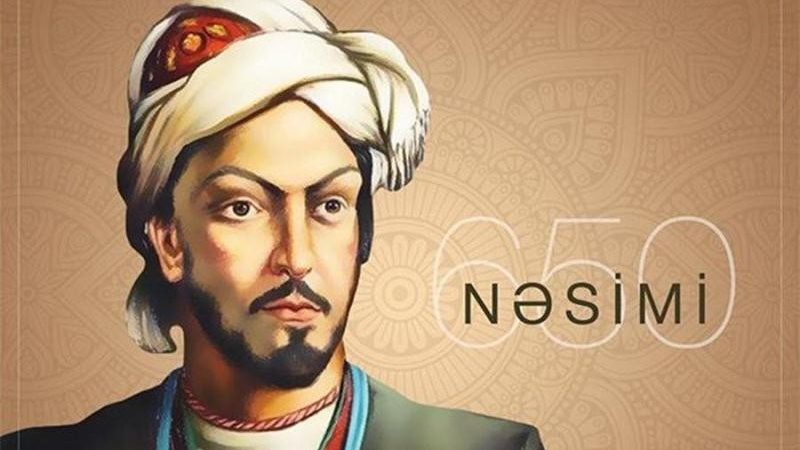Music in the works of Imadaddin Nasimi

Nasimi, whose real name was Syed Ali Imadaddin, was born in 1369 in Shamakhi, Azerbaijan. Following the execution of his teacher, Fazlullah Naimi, he left Shamakhi and went to Baghdad, where he began to spread Hurufism. For the reason that he did not give up his path, by the order of the Sultan he was skinned alive and killed painfully in Aleppo, in 1417.
In that period, Sufism was mostly widespread in modern Pakistan, Turkey, Azerbaijan, and Iran. According to Hurufism, which is a branch of Sufism, the universe is eternal, and at different times prophets have spread the religions. The outward appearance of God is immaculate and it is declered in the expression of the best of creation, human is the key to divinity and truth. Moreover, He is embodied in words, in 28 letters of the Arabic alphabet, which are considered to be the foundation of love and beauty. The number 7 is a saint number.
Hurufism was widely spread by I.Nasimi in Anatolia (Turkey) and Azerbaijan. Nasimi’s beautiful, exciting poems have played a major role in spreading Hurufism in Azerbaijan, Iran, Iraq, and Anatolia.
Safiaddin Urmavi (1216-1254, was born in Urmia, South Azerbaijan), an Azerbaijani music-mugham theorist who lived in Near and Middle East during the XIII century, and after him Abdulqadir Maraghai (1353-1435, was born in Maragha, South Azerbaijan), a musician, composer, singer, songwriter, poet, calligrapher – had gained much of fame, before and after the period that Nasimi lived.
Safiaddin Urmavi conducted his research in the XIII century on the basis of Arabic mugham. However, Abdulqadir Maraghai based his analysis on mugham and drew attention to the formation of each nation’s and region’s unique mugham language and style.
At the end of the XIV century there was a great gap in mugam music, and the “pillars” of mugam were about to fall into pieces. But soon the peoples of the Middle East rebuilt this collapsed “Music Building” and everyone “built” their own national music school of mugam.
During the time of Nasimi, there were notable changes in the life of mugham. The world-renowned Azerbaijani composer Uzeyir Hajibeyli (1885-1948) wrote in his work “Fundamentals of Azerbaijani folk music”: “The musical culture of the peoples of the Middle East has reached its peak in the late 14th century.”
And from this peak there was a spectacular view to the four sides of the world: from Andalusia (currently the province in Spain, whose capital is Seville) to China and from Africa to the Caucasus.
Nasimi called music a tasteful blessing that God bestowed upon His servants. How would the Quran be against poetry and music, when the Holy Book itself was formed on poetry and was written with a rhyming, rhythmic range of versification. Prophet Muhammad recommended reading the Quran with a beautiful voice, and also advised how to recite it: “Read the Quran with a plaintive tone, while it has been revealed with sadness.”
Nasimi was saying that music is a kind of food for the soul and was expressing his sympathy for mugham as well. In many examples of Nasimi’s poetry the terms of music, the names of mughams and musical instruments are found repeatedly.
By the decree of Ilham Aliyev, President of the Republic of Azerbaijan, 2019 is declared as “the Year of Nasimi”, with regard to the 650th birth anniversary of Nasimi.
Over the years, Azerbaijani composers have created a number of beautiful pieces of work on Nasimi’s words. Especially worth mentioning is the ballet named “Tale of Nasimi” (1973) by one of the prominent Azerbaijani composers, Fikret Amirov. This ballet sings the battle of good and evil and the victory of love.
Three-part “Nasimi” cantata, as well as romances named “Haq menem (I am the truth)”, “Buludlar (Clouds)” by prominent Azerbaijani composer Jahangir Jahangirov; “Konlum (My soul)”, “Gerekmez (No need)” romances by Tofig Guliyev; “Neylerem (What would I do)” chamber-vocal work by Suleyman Alasgarov; seven romances by Aghabaji Rzayeva, including “Bahar oldu (Spring came)”, “Gel nigarim (Come my nigar)” and “Gul achildi (Flower was opened)”; Emin Sabitoglu’s romances “Eyledi (She did)”, “Sen hardasan (Where are you)”; Ramiz Mustafayev’s romance “Bahar (Spring)”; Afrasiyab Badalbeyli’s “Nasimi” vocal choreographic poem; vocal works of Ramiz Mirishly, Said Rustamov and Nazim Aliverdibeyov; “Nasimi” symphonic poem for orchestra of Azer Rzayev; “Nasimi” symphonic poem of Aziz Azizly – are valuable musical examples related to Nasimi’s poetry and works.
Well-known Azerbaijani composer Firangiz Alizade has composed “Passion of Nasimi”. (Passion is a Latin word; passio means suffering, sorrow, grief). In this work, the composer was able to present a brilliant image of Nasimi as a great poet. Interest in Nasimi’s poems never diminishes, and composers always create new works.
It is worthwhile to mention that in Pakistan also “sufi music” is widely spread mainly in the form of Qawwali, and people enjoy listening to it and performing it. There can be found many similarities between Qawwali music and Mugham of Azerbaijan.
Vidadi Heydarov
Associate Professor at Fortepiano Department of Nakhchivan State University,
Republic of Azerbaijan
Related News

Mystery shrouds death of Libyan Army Chief
DNA TRIPOLI: The sudden death of Libya’s army chief of staff, General Mohammed Ali AhmedRead More

Saudi Arabia condemns attack on police
News Desk RIYADH: The Saudi Ministry of Foreign Affairs on Wednesday has condemned an attackRead More


Comments are Closed